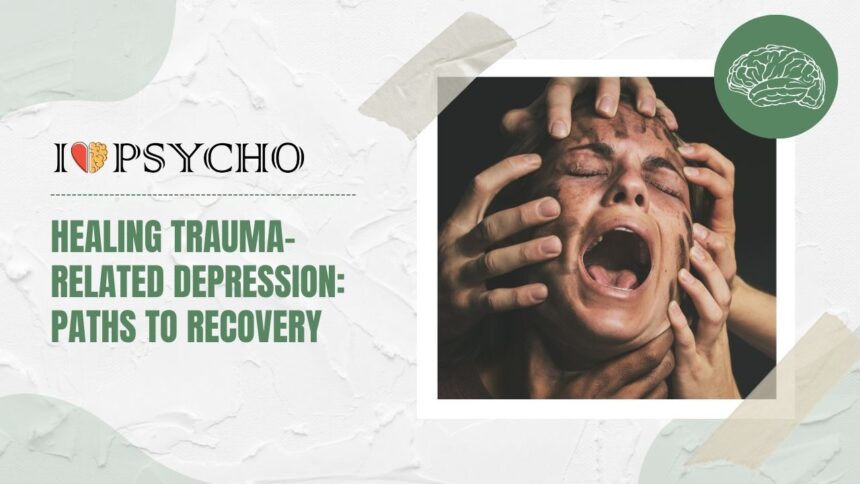Welcome to a journey of healing and hope. In the depths of trauma-related depression, it may feel like there is no light at the end of the tunnel. But rest assured, recovery is possible. This blog will guide you through understanding the roots of trauma-related depression, exploring traditional and alternative treatment options, sharing personal stories of triumph, and offering practical steps for crafting your own path to healing. Let’s embark on this transformative voyage together.
Understanding trauma-related depression
Trauma-related depression is a complex interplay between past experiences and present emotional struggles. It stems from traumatic events that have deeply impacted an individual’s sense of self and well-being. These events can range from childhood trauma, such as abuse or neglect, to more recent traumas like accidents or loss. The effects of trauma on the mind are profound, often manifesting in feelings of sadness, hopelessness, and anxiety.
This type of depression goes beyond typical mood fluctuations; it lingers persistently and disrupts daily functioning. Understanding trauma-related depression involves recognizing how these traumatic experiences have shaped one’s perception of themselves and the world around them. It requires delving into the depths of pain and fear that may have been buried for years.
Healing from trauma-related depression entails untangling the web of emotions tied to past traumas and learning to reframe negative thought patterns stemming from these experiences. By acknowledging the impact of trauma on mental health, individuals can begin to take steps towards reclaiming their sense of peace and joy in life.
Types of trauma that can lead to depression
Trauma comes in various forms, each capable of leaving a lasting impact on our mental health. Childhood trauma, such as abuse or neglect, can shape our adult experiences and contribute to depression. The weight of combat-related trauma experienced by veterans echoes long after the battle has ended, affecting their emotional well-being.
Survivors of natural disasters like hurricanes or earthquakes may struggle with feelings of helplessness and fear following the traumatic event. Additionally, interpersonal traumas like domestic violence or assault can shatter one’s sense of safety and trust in others.
Medical traumas stemming from serious illnesses or accidents can also lead to depressive symptoms as individuals grapple with the physical and emotional aftermath. Each type of trauma carries its own set of challenges that can manifest in varying degrees of depression.
Understanding the diverse nature of trauma is essential in recognizing how it intersects with mental health struggles like depression.
Symptoms of trauma-related depression
Living with trauma-related depression can manifest in various ways, impacting both the mind and body. One common symptom is persistent feelings of sadness or emptiness that seem to overshadow daily life. This emotional heaviness can make it challenging to find joy or motivation in things that once brought pleasure.
Individuals might also experience heightened levels of anxiety, feeling on edge or constantly worried about potential triggers. Sleep disturbances are another prevalent symptom, with many finding it difficult to fall asleep or stay asleep due to intrusive thoughts or nightmares related to their past traumas.
Physical symptoms such as fatigue, changes in appetite, and unexplained aches and pains can also accompany trauma-related depression. It’s essential to recognize these signs early on and seek support from mental health professionals who specialize in trauma-informed care.
Traditional treatment options for depression and their limitations
Traditional treatment options for depression, such as medication and therapy, have long been the go-to methods in addressing mental health concerns. While they can be effective for some individuals, they also come with limitations that may not work for everyone.
Medication, like antidepressants, can help manage symptoms of depression but may not always address the root cause of the issue. Additionally, finding the right medication and dosage can be a trial-and-error process that takes time.
Therapy is another common approach to treating depression, offering a safe space to explore emotions and develop coping strategies. However, access to therapy can be limited due to cost or availability in certain areas.
It’s essential to recognize that traditional treatments are not one-size-fits-all solutions. Exploring alternative methods alongside or instead of these options could provide a more holistic approach to healing trauma-related depression.
Alternative methods for healing trauma-related depression
Alternative methods for healing trauma-related depression offer unique approaches that go beyond traditional treatment options. These methods focus on addressing the root cause of the trauma to promote long-term healing and recovery. Some individuals find relief through holistic practices such as yoga, meditation, and acupuncture.
Art therapy is another alternative method that allows individuals to express their emotions creatively while processing traumatic experiences in a safe environment. Nature-based therapies like ecotherapy can also be beneficial in reconnecting with the natural world and promoting inner peace.
Mindfulness techniques, such as deep breathing exercises and guided imagery, help individuals stay present in the moment and reduce symptoms of anxiety and depression. Additionally, somatic experiencing therapy focuses on releasing physical tension stored in the body from past traumas.
Exploring these alternative methods alongside traditional treatments can provide a comprehensive approach to healing trauma-related depression. It’s essential to find what works best for each individual on their journey toward recovery.
The importance of addressing underlying trauma in recovery
Healing trauma-related depression goes beyond just treating the surface symptoms. It’s crucial to delve deep into the underlying trauma that may be contributing to your struggles. By addressing the root cause of your pain, you can truly begin a journey towards lasting recovery.
Trauma has a way of embedding itself in our minds and bodies, shaping how we view ourselves and the world around us. Untangling these complex emotions is key to moving forward in a healthier way. Ignoring the impact of past traumas can hinder your progress in overcoming depression.
Acknowledging and processing your past experiences takes courage and vulnerability but is essential for true healing to take place. It allows you to reclaim power over your narrative and rewrite it with resilience and strength. Only by confronting the shadows from our past can we step into a brighter future filled with hope and possibility.
Remember, healing is not linear – it’s a journey full of ups and downs, twists and turns. Be gentle with yourself as you navigate through this process of uncovering old wounds and allowing them to heal. Your willingness to confront your inner demons paves the way for profound transformation within yourself.”
Personal stories of overcoming trauma-related depression
Sarah’s journey through trauma-related depression was a challenging one. She found solace in therapy and the support of her loved ones, gradually learning to confront her past traumas head-on. Through self-reflection and perseverance, Sarah started to see glimpses of light amidst the darkness that once consumed her.
On the other hand, David turned to creative outlets like painting and writing poetry as a way to express his emotions. These artistic endeavors became his form of catharsis, allowing him to release pent-up feelings of pain and sorrow. Slowly but steadily, David began to find healing in the process of creating something beautiful out of his struggles.
Each personal story is unique yet intertwined by the common thread of resilience and determination. Despite facing different forms of trauma, these individuals found their own paths towards overcoming depression. Their experiences serve as a beacon of hope for others who may be struggling with similar challenges.
Mindfulness Practices for Coping with Trauma and Depression
Mindfulness practices offer a powerful tool for coping with trauma-related depression. By bringing awareness to the present moment without judgment, individuals can begin to unravel the grip of past traumas on their mental well-being.
Engaging in mindfulness activities such as meditation, deep breathing exercises, and yoga can help regulate emotions and reduce symptoms of anxiety and depression. These practices create space for self-compassion and acceptance, allowing individuals to explore their inner experiences with curiosity rather than avoidance.
Mindful eating is another beneficial practice that can foster a healthier relationship with food and body image, addressing potential triggers linked to trauma. By savoring each bite mindfully, individuals can reconnect with their bodies and cultivate a sense of control over their nourishment.
Incorporating mindfulness into daily routines provides a grounding anchor amidst the storm of intrusive thoughts and emotional turmoil. Practicing gratitude, journaling feelings, or simply taking mindful walks in nature can all contribute to building resilience and fostering healing from trauma-related depression.
Moving Forward: Creating a Personalized Plan for Recovery
Moving forward from trauma-related depression involves creating a personalized plan for recovery that suits your unique needs and experiences. It’s crucial to tailor your approach to healing based on what resonates with you and feels most effective in addressing the root causes of your emotional pain. This may involve a combination of therapy, self-care practices, support groups, and holistic techniques that align with your values and preferences.
Take the time to explore different options and find what works best for you in terms of managing symptoms, processing past traumas, and building resilience. Consider incorporating mindfulness practices such as meditation, yoga, or deep breathing exercises into your daily routine to help regulate emotions and cultivate inner peace.
Remember that healing is a journey with ups and downs, so be patient with yourself as you navigate this process. Surround yourself with supportive individuals who understand your struggles and can provide empathy during challenging times. By taking proactive steps towards recovery and staying committed to self-improvement, you can gradually move towards a place of greater well-being and wholeness.
Conclusion
Healing from trauma-related depression is a journey that requires patience, self-compassion, and commitment. By understanding the root causes of your depression, exploring various treatment options – both traditional and alternative, and incorporating mindfulness practices into your daily routine, it is possible to pave a path towards recovery.
Remember that each individual’s experience with trauma and depression is unique, so it’s essential to create a personalized plan that works best for you. Seek support from mental health professionals, lean on loved ones for guidance and encouragement, and most importantly, be gentle with yourself throughout the process.
Recovery may not be linear or easy, but by taking small steps every day towards healing and addressing underlying traumas head-on, you can regain control over your life and find hope for a brighter future ahead. Stay strong, stay resilient – you are worthy of healing and happiness.









